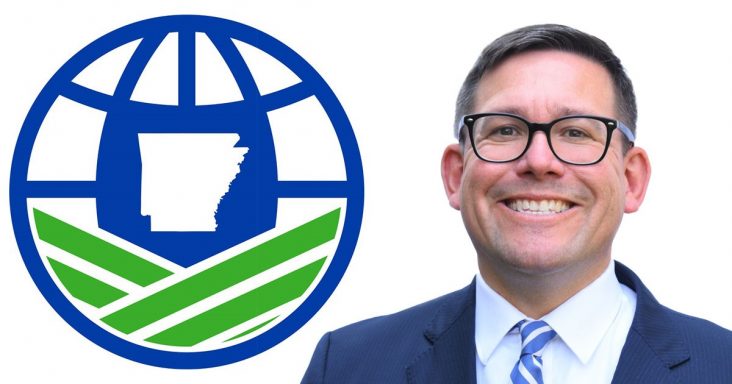Retired U.S. diplomat in Fayetteville starts company to provide foreign seasonal labor at scale
by September 9, 2021 3:25 pm 3,174 views

Dana Deree
While it has yet to launch formally, Conway-based Arkansas Global Connect has started to help employers meet their seasonal workforce needs. It’s placed about 200 foreign seasonal workers so far, but this could rise rapidly based on employer demand.
Arkansas native Dana Deree, president and founder of Arkansas Global Connect, said the company is one of “a handful of businesses” that can provide foreign seasonal labor at scale. Most are based on the East or West coasts or in Texas, but he noted his company has started or is looking to place workers for three companies.
Deree moved to Fayetteville in late February, and on March 1, he established the business. Arkansas Global Connect has an office at 1510 Mill St. in Conway and four employees. Deree said he plans to officially launch the company on Sept. 29 at a Little Rock event.
“We are primarily focused on providing labor from Honduras,” he said. “The business itself focuses on meeting the needs of the employers, but we also want to make a positive contribution to the lives of the workers, to their community. And when we get to the big numbers of workers, we believe that we can have a positive impact on the migration issue as well.”
He explained that the company has helped to bring foreign workers from the capital city of Honduras to the U.S. to work at carnivals and fairs.
“These are kids who had once lived on the streets of Tegucigalpa, were addicted to glue, and they – through a ministry in Honduras – have been educated and broken their addictions. And they’re in the U.S. now, and they are netting $400 a week, which is a tremendous amount of money for a young adult in Tegucigalpa, especially given where they started life.”
It brings seasonal workers to the U.S. through seasonal employment visas, including agricultural workers using H-2A visas and non-agricultural workers using H-2B visas.

For H-2A visas, the company focuses on providing labor for fruit and vegetables, which are the most labor-intensive industries but can also provide work for row crops, Deree added. He explained that for H-2B visas, labor demand is strong in the food processing, forestry, and hospitality sectors. Dozens of the workers the company has placed are housekeepers, groundskeepers, and cooks for hotels and tourist destinations. He said landscaping is another large industry for H-2B visas.
The United States does not limit workers with H-2A visas but only allows 66,000 workers on H-2B visas per year. He said the latter is reached within hours of becoming available. On Oct. 1, half of the visas will become available. The other half becomes available in the spring. However, over the summer, he said the Biden Administration allowed for an additional 6,000 visas for workers from the Northern Triangle of Central America, comprising Guatemala, Honduras and El Salvador. If more of the additional visas become available, he said the company would focus on H-2B visas. Otherwise, it would concentrate on seasonal agricultural workers on H-2A visas.
PROTECTING U.S. JOBS
Deree said Arkansas Global Connect is expected to add jobs quickly as it reaches agreements with employers seeking foreign seasonal workers. For example, he’s working on a contract with a Texas firm seeking 1,000 to 2,000 carnival workers for 2022.
The company also has a partnership with Tennessee-based law firm Youngblood & Associates that provides the capacity to file for any worker who qualifies under the law, he said. He explained that the seasonal employment visas are for up to 10 months. Employers using seasonal labor must show they have periods of seasonality or peak periods during the year when they need more workers than the rest of the year.
“The value that we offer, even though we are providing foreign workers, what we’re doing is allowing businesses to stay open and to expand,” he said. “We are in the business of protecting U.S. jobs. And under U.S. law, no company can use foreign seasonal workers unless they demonstrate they have been trying to hire U.S. workers. They also have to pay foreign workers a wage that the Department of Labor determines will not adversely affect U.S. wages.”
Agricultural employers can expect to receive foreign labor within 90 days of signing a contract with the company. It charges $150 per worker, but that could be adjusted based on scale. The fee includes:
- Recruiting the workers.
- Ensuring they are qualified for the type of work requested.
- Likely receiving and complying with the visa terms.
Employers also pay the legal filing fees for the foreign workers and their lodging and transportation costs to and from the U.S. Agricultural employers must provide room and board to the workers. He noted that the workers would only be responsible for buying their passports.
“If the question is whether your crops are going to rot in the field or not because you don’t have a workforce, it’s still a very reasonable price,” he added.
While the company is focused on providing labor from Honduras, it also has a partnership with a company that can provide workers from Mexico and globally. In Honduras, the Ministry of Labor offers a service that helps workers seeking foreign work, but he said Arkansas Global Connect would primarily recruit its workers.
‘PROFESSIONAL EXPERTISE’
“Given my professional expertise, I have a very good sense of who will qualify for a visa and who will comply with a visa,” he said. “And I want to make sure we’re providing the very best service possible.”
Deree recently retired from the U.S. Department of State after spending 20 years as a U.S. diplomat. He was looking to transition into a new career, one in which he could call on his experience as a Foreign Service Officer. He recalled from his experience working overseas that foreign workers who came to the U.S. for seasonal work were among the wealthiest residents in their communities.
“Early on in my career, my second tour was in Nicaragua, and I spent a year doing visa interviews,” he said. “While I was there, I adjudicated dozens of cases of beekeepers who were coming to the U.S. for seasonal work, and my employees told me, these were the richest guys in their towns. They would come for several months, work, bring back their earnings, reinvest them, and start businesses. I became a big believer in the promise of seasonal employment visas.
“Over the years, I had several diplomatic assignments, but at different times I would interact with this type of visa,” he added. “And I came to know the industry really well.”
Late last year, when he could retire and return to Arkansas, Deree decided to start his business.
‘A TREMENDOUS NEED’
“It’s something that I believe in deeply,” he explained. “There’s a tremendous need that farmers and other businesses have for seasonal employment. It’s hard already to staff a lot of businesses in the U.S., but seasonal businesses have even more difficultly because it’s only for a certain time of the year. That combined with the transformative possibilities for the workers themselves is something that I knew – after this exciting career that I just wrapped up – I’d be able to jump out of bed every single day to focus on.”
In three years, he expects the company would be providing between 2,000 and 5,000 foreign workers to U.S. employers annually. While the company will focus on meeting the needs of Arkansas employers, it’s not limiting itself to only working with employers in the state.
His business also includes training for companies and organizations looking to travel overseas. The training would consist of how to stay safe and what to do if something goes wrong. He said he’d also be on call to help if needed. His state department experience also included crisis response, including overseeing the U.S. response to earthquakes, hurricanes, kidnappings, murders and lost passports. His last Foreign Service assignment was as coordinator of U.S. citizen services in Mexico.
